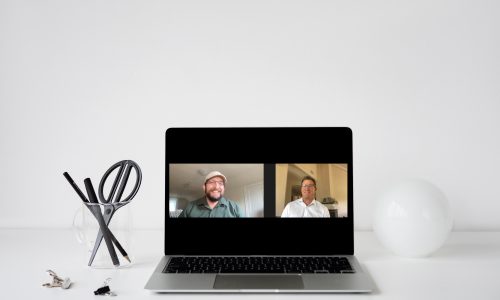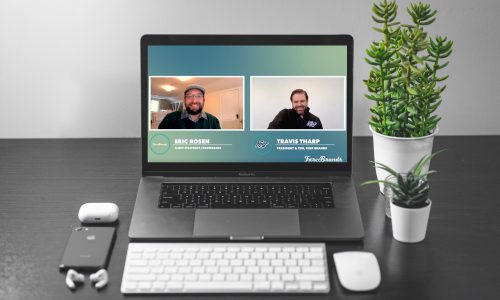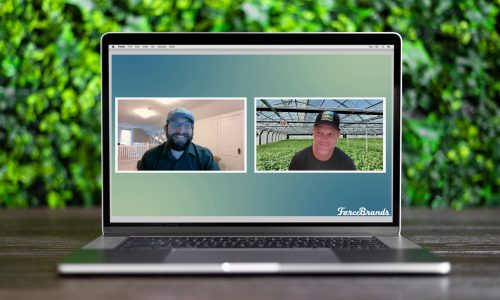Dubbed by media outlets as the Queen of Legal Weed and the Martha Stewart of edibles (before the celebrated lifestyle entrepreneur entered the category herself), Nancy Whiteman has reached celebrity status in the cannabis industry. And rightfully so.
It doesn’t get much more grassroots than Wana, Whiteman tells us in this episode of Cannabis Matters. We caught up with CEO and co-founder to learn more about how she unintentionally ventured into the industry, how the company has evolved after being acquired by cannabis giant Canopy Growth, and more.
Watch her interview with ForceBrands’ Client Strategist and series host Eric Rosen and read the transcription of the conversation below:
Eric Rosen: I rarely get starstruck. I could meet Brad Pitt and probably just shake his hand and walk away. I meet cannabis business leaders and cannabis superstars and I’m like tongue-tied. It’s really kind of funny.
Nancy, thank you so much for joining Cannabis Matters today. It’s an absolute pleasure to have you.
Nancy Whiteman: Thank you, it’s a pleasure to be here.
ER: You’ve had quite the journey with Wana Brands. Walk us through your background, how you initially decided to get into the industry, and how you’ve really become known as the Queen of Legal Weed.
NW: My background is actually very traditional and kind of conventional. I have an MBA, I worked in corporate America in financial services and technology for years and years and then ended up moving to Colorado about 25 years ago and started consulting because I had two young children and wanted to have a little bit more flexibility with my time and what I really found was that it’s very hard to scale a services-based business.
I was always very interested in a product-based business and then some serendipity happened. I literally was never thinking about cannabis. I always joke that I need a better back story, but what happened was one of my kids had a friend over and her father came to pick her up and we got to chatting. He was a commercial real estate developer in 2010, it was a really hard time to be a commercial real estate developer in Colorado and I asked him so what are you doing these days and he said, ‘You wouldn’t approve,’ and I said, ‘Oh really, you don’t know me that well, why don’t you give it a try.’ And so he told me he was doing an infused-soda pop company and that was actually very funny because while I was very familiar with cannabis, I wasn’t familiar with the medical terminology around cannabis so I asked, ‘What’s it infused with?; I actually didn’t even know what he was talking about but we ended up building out a kitchen with him. He was already in business but he was just making soda at that point and we parted ways rather quickly — many of those early cannabis partnerships were like that.
He got us going and we continued on and it’s kind of a funny thing, I really didn’t understand the power of what we were doing because I had always used cannabis recreationally and of course at that point in Colorado was just medical and while I certainly didn’t discount it, I had no personal knowledge of the medical uses of cannabis so it was this enormous lightbulb going off when we started to get feedback from customers about how much our products were helping them.
I started to realize the power of the plant and become very passionate about being part of that and then things have grown very organically from there. I think like all business, it’s a combination of good luck, good timing, and good decisions — all of those things come into play.
In terms of the Queen of Legal Weed, that was a title that was conferred upon me by a very wonderful reporter at Inc. Magazine and I love it of course and the funnier one is of course maybe a year or two later, Entrepreneur magazine dubbed me the Martha Stewart of Edibles and when we found out that Martha had entered the industry herself with CBD gummies, I had to retire my title and give it back to to the original. So Martha is the Martha Stewart of edibles now but I do like both of those titles. They’re fun.
ER: If you had to call out one thing, what would you attribute the staying power and success of Wana to?
NW: Being able to start in Colorado in 2010 when there were very low barriers to entry was a great stroke of luck, before it was highly competitive, before it cost a million dollars to get in. A little company like mine — and when I mean little, I mean little. We bootstrapped the whole thing, and literally tested non-medicated recipes in my home kitchen because I did have school-aged children at that point. You really don’t get much more grassroots than Wana.
I always tell people that what’s required to be successful in cannabis is first of all a good idea and a good product but there’s a level of resilience and persistence that’s needed in cannabis that is unlike any other industry that I have ever seen or worked in.
Things change constantly and they change fast and sometimes they change in ways that you think, ‘Oh my gosh I have absolutely no idea how I’m going to deal with this.’ And I think there has to be a love for the unformed, if you will. I think a lot of people would have looked at cannabis and said, ‘You know there’s no infrastructure,’ but I found that fun and interesting and stimulating, so I think you have to have a love for that. And then I would say that being fascinated by the plant and the power of the plant is one of the keys to success as well.
ER: As you think about team building, I’m sure your thinking has evolved over the years, how do you think about organizational design, the art and science of building teams, and hiring strategies in today’s job market?
NW: Organizational design might be a little lofty. We’re still a relatively small organization and so both by necessity and also just by philosophy, we’re pretty flat. We don’t have a lot of layers. It’s very unbureaucratic. Functionally, it works very well that way.
Colorado is a pretty mature market so most of our growth and most of our hiring is actually happening in the 15 other markets where we have a presence in the U.S. and then also nine markets in Canada and we really are looking to beef up that piece of business and put more resources into the field closer to the market, so a lot of our hiring is really there.
In terms of a hiring philosophy, I think I would say that we have an underlying philosophy, which also feels a little lofty to me, but I suppose that we do have one. I really think that it begins with making sure that Wana is a place where people would want to work because if you’re a good salesperson, you can talk people into coming to work for you, but if you’re not really a great organization and you don’t really have a culture that’s inclusive and supportive, people are not going to want to stay there. So that’s what we focus on.
Obviously competitive salaries and competitive benefits are important but we want a place where people feel valued and supported.
We try to cast a very wide net when we are recruiting to get the most diverse candidate pool and then we hire the best person we can find, which not coincidentally is often the most diverse candidate.
I’m very pleased with how that’s shaped at Wana.
ER: How do you deal with the right amount of legacy talent and cannabis acumen and outside talent from maybe Fortune 500, traditional CPG for business acumen to be able to grow and scale the organization, and that balance looks differently based on where a company is at from its size, its scale, its trajectory and where it’s at on the maturity curve so I’m curious how do you and Wana think about balancing that in real-time as you’ve grown and evolved?
NW: Yeah, that’s a great question and I’ve seen the pendulum swing both ways as I’ve watched other companies try to do this. Most of us started out with some level of legacy knowledge I would say. And then I started to see companies swing toward big CPG hires for example on my side, on the brand side of things, and the people who are coming out of that world often have incredibly wonderful skill sets but what they know how to do generally is to launch and scale for a national business, which is completely different than what we have in cannabis, so in terms of my own philosophy on hiring and I just recently hired both a new COO and a new CFO, I do really like it when people come in with larger company experience but I’m also looking for evidence that they have an entrepreneurial flair and the ability to flex what I was saying before with the persistence and the resilience.
ER: Part of the startup experience reminds me of a quote that I read from you about normalizing anxiety, fear, and doubt just as part of the journey and so how do you balance these from a personal sustainability perspective, and how do you encourage other leaders at Wana to do the same?
NW: I think you have to make room for others to talk about how they’re feeling about things and you know I’ll give you a concrete example because this is all sort of abstract what I’m talking about but when we completed the transaction with Canopy, when you go through an experience like that, it’s exciting and wonderful and amazing and all those great things and then you kind of look around because as of course you know these things take a long time, you’re setting up for them for literally years, you’re trying to get the company ready, you’re getting yourself ready, and then all of a sudden it’s done.
And there’s sort of a recalibration period of time and I was really feeling it like, ‘What’s it all about? Now, what’s my new why?’ And I started to talk about it with my leadership team and said, I am feeling this. Are you feeling this, too? And two people said, Thank God you’re bringing this up, because I’m feeling it, too. And because we were able to talk about it, we actually went through a very deliberate process of sort of revisiting what our ‘why’ was and regaining our passion for why we’re still all at Wana and why we want to be at Wana. And if I hadn’t opened the door up for that, I’m not sure that we could have gone there as an organization and kind of moved through it. I now feel kind of reinvigorated and ready to tackle all the challenges of this industry.
ER: And what is your ‘why’?
NW: I think our ‘whys’ really have to do a lot with the excitement of being part of an industry that we really feel has the potential to do major good in the world, and to focus on innovation and research that’s going to move the needle on that.
ER: I’d love to hear your thoughts on Wana as a platform for good you’re doing a lot of work in the realm of social responsibility, Cannabis for Justice, the Wana Foundation, talk to us about Wana as a platform.
NW: Post-transaction, I was able to found the Wana Brands Foundation, which is an extension of a lot of the same goals and ideas that we care about and I guess just to describe it sort of briefly, what we focus on both through Wana CSR, although there’s some stuff that we can fund through Wana CSR that we can’t do through the foundation just because it has to you know have a certain 501c3 designation, but we focus on a lot of what we call life essentials or things that we feel that everybody needs to have access to to have a decent life, and those include food security, housing, mental health, social justice, voter rights and education, sustainability, and community and connection. So those are our key areas and then in addition to that, we also do larger gifts for medical research and cannabis education and specifically cannabis education that helps support creating a more diverse industry with opportunity for everybody. So those are some of the focus areas in terms of what we’ve done so far, just a couple of examples: the voter education we’ve partnered with the League of Women Voters and they come with us and we do pop-ups together and so at the pop-ups, we’re doing voter registration and also checking on, because we are targeting young people who I’m sure you know are least likely to vote in the midterms, and we want to make sure that their addresses are correct because if they don’t get that, then they don’t get the mail-in ballots and all the statistics show that if you don’t get the mail-in ballots, the chances that you’re going to vote go way down. We also support Vote 4-1-1 which is the League of Women Voter’s major voter education website and it’s kind of a cool thing because to my knowledge, I think we’re the first cannabis company that they have partnered with and that’s one of the ways that we normalize and breakthrough in mainstream cannabis is that we do try to work with national-level organizations in addition to local.
ER: Nancy this has been incredible. Thank you so much for joining us today.
NW: Thank you for having me. I really appreciate it.
Catch up on more episodes from Cannabis Matters here.
Interested in learning more about the cannabis industry and how ForceBrands’ cannabis practice can help grow your business or career? Reach out to Eric Rosen to start the conversation.






